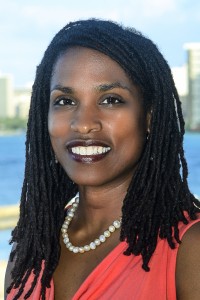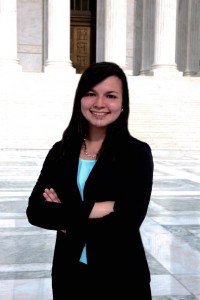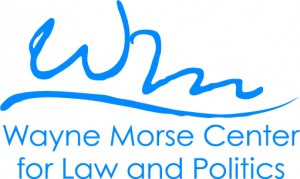2016
The 2016 Climate Change and Indigenous Peoples Lecture featured Maxine Burkett and Elizabeth Kronk Warner. The event took place on April 25, 2016 at the Many Nations Longhouse and explored Tribal sovereignty, traditional knowledges and climate-induced change among Indigenous peoples in the United States. Wisdom of the Elders recorded the lecture, which is available here: https://vimeo.com/172984433
The speakers were also interviewed for the UO Media Channel and discussed how climate change impacts indigenous communities on Pacific Islands and in the Arctic, and the role law can play in planning for adaptation to loss of resources and land. That recording is available here: http://media.uoregon.edu/channel/archives/10798
Keynote Speakers:
 Maxine Burkett joined the William S. Richardson School of Law in 2009. She teaches Climate Change Law and Policy, Torts, Ocean and Coastal Law, and International Environmental Law. She has written extensively in diverse areas of climate law with a particular focus on climate justice, exploring the disparate impact of climate change on vulnerable communities in the United States and globally. Professor Burkett has presented her research on the law and policy of climate change throughout the United States and in West Africa, Asia, Europe, and the Caribbean. Her work has been cited in numerous news and policy outlets, including BBC Radio, the ABA Journal, the New York Times, and Nature Climate Change. In 2010, Burkett served as the Wayne Morse Chair of Law and Politics at the Wayne Morse Center, University of Oregon, for the Center’s “Climate Ethics and Climate Equity” theme of inquiry. From 2009-2012, Professor Burkett also served as the inaugural Director of the Center for Island Climate Adaptation and Policy (ICAP). As the Director of ICAP, she led projects to address climate change policy and planning for island communities globally. She directed the completion of several adaptation related policy documents, outreach and education programs, and decision-maker support efforts for Hawai‘i and other Pacific Island nations. Professor Burkett attended Williams College and Exeter College, Oxford University, and received her law degree from Boalt Hall School of Law at the University of California, Berkeley. She served as a law clerk for The Honorable Susan Illston of the United States District Court, Northern District of California. She was a White House intern and an Omidyar Fellow. She serves on the boards of Global Greengrants Fund and Kanu Hawaiʻi and is a member scholar for the Center for Progressive Reform. Prior to her appointment at the University of Hawai‘i, Professor Burkett taught at the University of Colorado Law School.
Maxine Burkett joined the William S. Richardson School of Law in 2009. She teaches Climate Change Law and Policy, Torts, Ocean and Coastal Law, and International Environmental Law. She has written extensively in diverse areas of climate law with a particular focus on climate justice, exploring the disparate impact of climate change on vulnerable communities in the United States and globally. Professor Burkett has presented her research on the law and policy of climate change throughout the United States and in West Africa, Asia, Europe, and the Caribbean. Her work has been cited in numerous news and policy outlets, including BBC Radio, the ABA Journal, the New York Times, and Nature Climate Change. In 2010, Burkett served as the Wayne Morse Chair of Law and Politics at the Wayne Morse Center, University of Oregon, for the Center’s “Climate Ethics and Climate Equity” theme of inquiry. From 2009-2012, Professor Burkett also served as the inaugural Director of the Center for Island Climate Adaptation and Policy (ICAP). As the Director of ICAP, she led projects to address climate change policy and planning for island communities globally. She directed the completion of several adaptation related policy documents, outreach and education programs, and decision-maker support efforts for Hawai‘i and other Pacific Island nations. Professor Burkett attended Williams College and Exeter College, Oxford University, and received her law degree from Boalt Hall School of Law at the University of California, Berkeley. She served as a law clerk for The Honorable Susan Illston of the United States District Court, Northern District of California. She was a White House intern and an Omidyar Fellow. She serves on the boards of Global Greengrants Fund and Kanu Hawaiʻi and is a member scholar for the Center for Progressive Reform. Prior to her appointment at the University of Hawai‘i, Professor Burkett taught at the University of Colorado Law School.
 Elizabeth Kronk Warner joined the University of Kansas (KU) Law faculty in June 2012. Prior to her arrival at KU, Warner served on the law faculties at Texas Tech University and the University of Montana. In 2010, Warner was selected to serve as an Environmental Justice Young Fellow through the Woodrow Wilson International Center for Scholars and U.S.-China Partnership for Environmental Law at Vermont Law School. She has also served as a visiting professor at Xiamen University in Xiamen, China, and Bahcesehir University in Istanbul, Turkey. In 2014, Warner received the Immel Award for Excellence in Teaching. Her scholarship, which focuses primarily on the intersection of Indian Law and Environmental Law, is published in several prominent journals, including the Arizona Law Review, Colorado Law Review and Columbia Journal of Environmental Law. She is also co-author of the casebook, Native American Natural Resources. She has written extensively on the topic of climate change and its impacts on Indian country, including co-editing the book Climate Change and Indigenous Peoples: The Search for Legal Remedies. In addition to teaching, Warner serves as an appellate judge for the Sault Ste. Marie Tribe of Chippewa Indians Court of Appeals in Michigan, and as a District Judge for the Prairie Band Potawatomi Nation located in Kansas. Before entering academia, Warner practiced environmental, Indian, and energy law as an associate in the Washington, D.C. offices of Latham & Watkins LLP and Troutman Sanders LLP. Warner previously served as chair of the Federal Bar Association Indian Law Section and was elected to the Association’s national board of directors in 2011. She currently serves as chairwoman of the Kansas Advisory Committee to the U.S. Civil Rights Commission. She received her J.D. from the University of Michigan Law School and a B.S. from Cornell University. Warner is a citizen of the Sault Ste. Marie Tribe of Chippewa Indians.
Elizabeth Kronk Warner joined the University of Kansas (KU) Law faculty in June 2012. Prior to her arrival at KU, Warner served on the law faculties at Texas Tech University and the University of Montana. In 2010, Warner was selected to serve as an Environmental Justice Young Fellow through the Woodrow Wilson International Center for Scholars and U.S.-China Partnership for Environmental Law at Vermont Law School. She has also served as a visiting professor at Xiamen University in Xiamen, China, and Bahcesehir University in Istanbul, Turkey. In 2014, Warner received the Immel Award for Excellence in Teaching. Her scholarship, which focuses primarily on the intersection of Indian Law and Environmental Law, is published in several prominent journals, including the Arizona Law Review, Colorado Law Review and Columbia Journal of Environmental Law. She is also co-author of the casebook, Native American Natural Resources. She has written extensively on the topic of climate change and its impacts on Indian country, including co-editing the book Climate Change and Indigenous Peoples: The Search for Legal Remedies. In addition to teaching, Warner serves as an appellate judge for the Sault Ste. Marie Tribe of Chippewa Indians Court of Appeals in Michigan, and as a District Judge for the Prairie Band Potawatomi Nation located in Kansas. Before entering academia, Warner practiced environmental, Indian, and energy law as an associate in the Washington, D.C. offices of Latham & Watkins LLP and Troutman Sanders LLP. Warner previously served as chair of the Federal Bar Association Indian Law Section and was elected to the Association’s national board of directors in 2011. She currently serves as chairwoman of the Kansas Advisory Committee to the U.S. Civil Rights Commission. She received her J.D. from the University of Michigan Law School and a B.S. from Cornell University. Warner is a citizen of the Sault Ste. Marie Tribe of Chippewa Indians.
 Respondent: University of Oregon Law Student Meghan “Sigvanna” Topkok will serve as a respondent to the keynote speakers, providing her own perspectives and fostering dialogue between the speakers. Topkok is Iñupiaq with roots in Ambler and Nome, Alaska. Sigvanna is a student at the University of Oregon School of Law and intends to focus her studies on the interstices of federal Indian, environmental, and international law. She plans to return to Alaska after graduation to promote tribal sovereignty as a safeguard for the traditions and knowledge that have been passed down since time immemorial. She is passionate about learning and sharing her language and culture, and looks forward to giving back to her tribe and being an advocate for her people and the land they rely on.
Respondent: University of Oregon Law Student Meghan “Sigvanna” Topkok will serve as a respondent to the keynote speakers, providing her own perspectives and fostering dialogue between the speakers. Topkok is Iñupiaq with roots in Ambler and Nome, Alaska. Sigvanna is a student at the University of Oregon School of Law and intends to focus her studies on the interstices of federal Indian, environmental, and international law. She plans to return to Alaska after graduation to promote tribal sovereignty as a safeguard for the traditions and knowledge that have been passed down since time immemorial. She is passionate about learning and sharing her language and culture, and looks forward to giving back to her tribe and being an advocate for her people and the land they rely on.
For More Information:
Kathy Lynn, UO Environmental Studies, 541-346-5777, kathy@uoregon.edu
Mark Carey, UO Clark Honors College, 541-346-8077, carey@uoregon.edu

 Maxine Burkett joined the William S. Richardson School of Law in 2009. She teaches Climate Change Law and Policy, Torts, Ocean and Coastal Law, and International Environmental Law. She has written extensively in diverse areas of climate law with a particular focus on climate justice, exploring the disparate impact of climate change on vulnerable communities in the United States and globally. Professor Burkett has presented her research on the law and policy of climate change throughout the United States and in West Africa, Asia, Europe, and the Caribbean. Her work has been cited in numerous news and policy outlets, including BBC Radio, the ABA Journal, the New York Times, and Nature Climate Change. In 2010, Burkett served as the Wayne Morse Chair of Law and Politics at the Wayne Morse Center, University of Oregon, for the Center’s “Climate Ethics and Climate Equity” theme of inquiry. From 2009-2012, Professor Burkett also served as the inaugural Director of the Center for Island Climate Adaptation and Policy (ICAP). As the Director of ICAP, she led projects to address climate change policy and planning for island communities globally. She directed the completion of several adaptation related policy documents, outreach and education programs, and decision-maker support efforts for Hawai‘i and other Pacific Island nations. Professor Burkett attended Williams College and Exeter College, Oxford University, and received her law degree from Boalt Hall School of Law at the University of California, Berkeley. She served as a law clerk for The Honorable Susan Illston of the United States District Court, Northern District of California. She was a White House intern and an Omidyar Fellow. She serves on the boards of Global Greengrants Fund and Kanu Hawaiʻi and is a member scholar for the Center for Progressive Reform. Prior to her appointment at the University of Hawai‘i, Professor Burkett taught at the University of Colorado Law School.
Maxine Burkett joined the William S. Richardson School of Law in 2009. She teaches Climate Change Law and Policy, Torts, Ocean and Coastal Law, and International Environmental Law. She has written extensively in diverse areas of climate law with a particular focus on climate justice, exploring the disparate impact of climate change on vulnerable communities in the United States and globally. Professor Burkett has presented her research on the law and policy of climate change throughout the United States and in West Africa, Asia, Europe, and the Caribbean. Her work has been cited in numerous news and policy outlets, including BBC Radio, the ABA Journal, the New York Times, and Nature Climate Change. In 2010, Burkett served as the Wayne Morse Chair of Law and Politics at the Wayne Morse Center, University of Oregon, for the Center’s “Climate Ethics and Climate Equity” theme of inquiry. From 2009-2012, Professor Burkett also served as the inaugural Director of the Center for Island Climate Adaptation and Policy (ICAP). As the Director of ICAP, she led projects to address climate change policy and planning for island communities globally. She directed the completion of several adaptation related policy documents, outreach and education programs, and decision-maker support efforts for Hawai‘i and other Pacific Island nations. Professor Burkett attended Williams College and Exeter College, Oxford University, and received her law degree from Boalt Hall School of Law at the University of California, Berkeley. She served as a law clerk for The Honorable Susan Illston of the United States District Court, Northern District of California. She was a White House intern and an Omidyar Fellow. She serves on the boards of Global Greengrants Fund and Kanu Hawaiʻi and is a member scholar for the Center for Progressive Reform. Prior to her appointment at the University of Hawai‘i, Professor Burkett taught at the University of Colorado Law School. Elizabeth Kronk Warner joined the University of Kansas (KU) Law faculty in June 2012. Prior to her arrival at KU, Warner served on the law faculties at Texas Tech University and the University of Montana. In 2010, Warner was selected to serve as an Environmental Justice Young Fellow through the Woodrow Wilson International Center for Scholars and U.S.-China Partnership for Environmental Law at Vermont Law School. She has also served as a visiting professor at Xiamen University in Xiamen, China, and Bahcesehir University in Istanbul, Turkey. In 2014, Warner received the Immel Award for Excellence in Teaching. Her scholarship, which focuses primarily on the intersection of Indian Law and Environmental Law, is published in several prominent journals, including the Arizona Law Review, Colorado Law Review and Columbia Journal of Environmental Law. She is also co-author of the casebook, Native American Natural Resources. She has written extensively on the topic of climate change and its impacts on Indian country, including co-editing the book Climate Change and Indigenous Peoples: The Search for Legal Remedies. In addition to teaching, Warner serves as an appellate judge for the Sault Ste. Marie Tribe of Chippewa Indians Court of Appeals in Michigan, and as a District Judge for the Prairie Band Potawatomi Nation located in Kansas. Before entering academia, Warner practiced environmental, Indian, and energy law as an associate in the Washington, D.C. offices of Latham & Watkins LLP and Troutman Sanders LLP. Warner previously served as chair of the Federal Bar Association Indian Law Section and was elected to the Association’s national board of directors in 2011. She currently serves as chairwoman of the Kansas Advisory Committee to the U.S. Civil Rights Commission. She received her J.D. from the University of Michigan Law School and a B.S. from Cornell University. Warner is a citizen of the Sault Ste. Marie Tribe of Chippewa Indians.
Elizabeth Kronk Warner joined the University of Kansas (KU) Law faculty in June 2012. Prior to her arrival at KU, Warner served on the law faculties at Texas Tech University and the University of Montana. In 2010, Warner was selected to serve as an Environmental Justice Young Fellow through the Woodrow Wilson International Center for Scholars and U.S.-China Partnership for Environmental Law at Vermont Law School. She has also served as a visiting professor at Xiamen University in Xiamen, China, and Bahcesehir University in Istanbul, Turkey. In 2014, Warner received the Immel Award for Excellence in Teaching. Her scholarship, which focuses primarily on the intersection of Indian Law and Environmental Law, is published in several prominent journals, including the Arizona Law Review, Colorado Law Review and Columbia Journal of Environmental Law. She is also co-author of the casebook, Native American Natural Resources. She has written extensively on the topic of climate change and its impacts on Indian country, including co-editing the book Climate Change and Indigenous Peoples: The Search for Legal Remedies. In addition to teaching, Warner serves as an appellate judge for the Sault Ste. Marie Tribe of Chippewa Indians Court of Appeals in Michigan, and as a District Judge for the Prairie Band Potawatomi Nation located in Kansas. Before entering academia, Warner practiced environmental, Indian, and energy law as an associate in the Washington, D.C. offices of Latham & Watkins LLP and Troutman Sanders LLP. Warner previously served as chair of the Federal Bar Association Indian Law Section and was elected to the Association’s national board of directors in 2011. She currently serves as chairwoman of the Kansas Advisory Committee to the U.S. Civil Rights Commission. She received her J.D. from the University of Michigan Law School and a B.S. from Cornell University. Warner is a citizen of the Sault Ste. Marie Tribe of Chippewa Indians. Respondent: University of Oregon Law Student Meghan “Sigvanna” Topkok will serve as a respondent to the keynote speakers, providing her own perspectives and fostering dialogue between the speakers. Topkok is Iñupiaq with roots in Ambler and Nome, Alaska. Sigvanna is a student at the University of Oregon School of Law and intends to focus her studies on the interstices of federal Indian, environmental, and international law. She plans to return to Alaska after graduation to promote tribal sovereignty as a safeguard for the traditions and knowledge that have been passed down since time immemorial. She is passionate about learning and sharing her language and culture, and looks forward to giving back to her tribe and being an advocate for her people and the land they rely on.
Respondent: University of Oregon Law Student Meghan “Sigvanna” Topkok will serve as a respondent to the keynote speakers, providing her own perspectives and fostering dialogue between the speakers. Topkok is Iñupiaq with roots in Ambler and Nome, Alaska. Sigvanna is a student at the University of Oregon School of Law and intends to focus her studies on the interstices of federal Indian, environmental, and international law. She plans to return to Alaska after graduation to promote tribal sovereignty as a safeguard for the traditions and knowledge that have been passed down since time immemorial. She is passionate about learning and sharing her language and culture, and looks forward to giving back to her tribe and being an advocate for her people and the land they rely on.